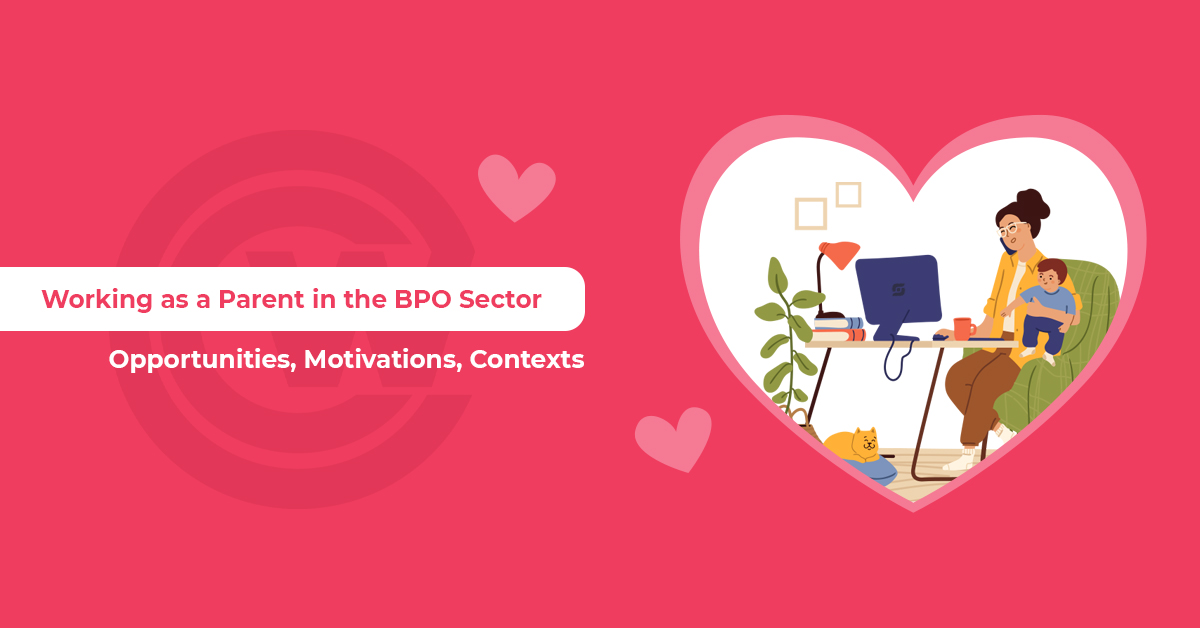In nearly two-thirds of the world's countries - 125 in total - Mother's Day is celebrated in May, and this year it coincides with International Workers' Day - also known as Labour Day in some regions - in many countries. This is an excellent opportunity to examine the impact of motherhood, and parenthood in general, on work and vice versa. What are the possibilities for single mothers with young children in the business services sector? How can we position ourselves as both parents and workers? How does flexibility in an employer create loyalty? How do our personality traits and motivations change as we have children, and do we acquire new soft skills? How does this affect the daily life of an international BPO contact center business, and the customer experience delivered? In today's case study, with the input of both managers and operators from United Call Centers, we seek to answer questions like these.
Table of contents:
Family or career? Family and career!
Newly acquired soft skills
The importance of employer flexibility
Who is an expert?
Changing circumstances, new motivations
Less spare time - better time management?
The test of a theory is practice
Work and family relations - Quotes from the team
Family or career? Family and career!
Not necessarily in the business field, but to this day we can hear, so to speak, superficial opinions that motherhood and career development are mutually exclusive. However, those who are familiar with the business services sector from the inside will find plenty of counter-examples, as it offers a wide range of opportunities for those who, for whatever reason, cannot or do not want to take up a full-time job. This type of work arrangement is not uncommon in the BPO customer service sector, as it makes it easier to integrate staff who are otherwise 100 percent capable of performing tasks, but who would not have the time and energy to do so at home in a traditional nine-to-five office job. But this trade-off is a win-win situation for clients, service providers, employees, and customers. Our colleague said:
"I used to work in a similar field, in an in-house customer service department, where the working hours were fixed, with multiple shifts. After I had my child, it became very important for me to find an opportunity that would be broadly compatible with our lives, where we could achieve a happy medium between work and private life.
My current job was the only one that described itself as family-friendly in the job advertisement. In the personal interview, there was hardly any mention of who I was or whether I could fit into this environment, much more emphasis on the opportunities I could have as a mother in the company. I have been in a home office for a while now, so it is much easier to manage my time. And every day after work, I have quality time to spend with my four-year-old daughter."
Newly acquired soft skills
The question is, how exceptional is this attitude? Often we tend to think of companies as impersonal profit-only entities, but in recent years, terms such as employee wellbeing have become increasingly prominent globally. Today, no company can afford to have employees with children at a disadvantage in any respect when interviewing for a job. On the one hand, an employee with a family may take more unplanned leave, but on the other hand, someone with children has a wealth of experience - or newly acquired soft skills - that comes in handy when working for an international BPO contact center provider that communicates with customers 24 hours a day.
But how does a decentralized, essentially flexible workplace help parents? You don't need a degree in psychology to know that work and private life interact: if I can't cope as a parent, it can create tension at work. If there is tension in the family, it takes the focus off work. And along these lines, a negative spiral of mutual dissatisfaction can start. Here's what our colleagues had to say about this:
"In a customer service company, the importance of communication and good working relationships cannot be overemphasized. Because, even though it's a workplace, everyone is human, everyone is in the same boat in this respect, regardless of position. If you have to go and pick up your child because the nursery or school has called, then in an operator's job it's no question of having to leave immediately. Then we'll figure out how to make up the lost time. There are always two sides to the coin, and maybe that's why it doesn't cause us stress. If you look around, you can see that there are a lot of parents with young children, both in the management and among colleagues, we all know what it's like when something comes up, and obviously, no one wants our child to be the last one to be taken out of the nursery. These situations are familiar to almost everyone, so they are easier to manage."
"A good team is important. It's a collaboration where there is a shared interest between employee and employer. If a company works in a flexible, family-friendly way, then employees will reciprocate as and when they can, to balance things out."
The flexibility of the employer is one of the foundations of team stability
This may seem like a contradiction in terms at first hearing, but when you think about it, it's not so surprising. After all, adaptability is necessarily one of the most important attributes of outsourced customer services in all possible contexts. Among other things, it is what allows an operator who is forced to miss a few hours or even several days of work because of a family matter to fill the gap relatively easily by a professional BPO company, even with a redeployment from another campaign with a lower call volume at the time. For an international contact center, this is not a problem even for projects in exotic language areas, as responsiveness is the basis of the system and the service. Ideally, this principle works in the same way in all directions, whether it is the client's needs, the service provided to customers, or the attitude towards the contact center's own employees. A good team is essential for a maximum customer experience, and a stable team is not possible without good communication - in simple terms, we bond better with a company that not only has expectations but also does something for its employees. But how does this work in practice?
"I'm not saying that it doesn't cause some headaches if an operator has to step off the line overnight, but fortunately there are enough reserves everywhere in the team that replacements can be made on any campaign, even immediately. We know that sometimes a sick child may not have serious symptoms in a physical sense, but they need to be attended to even more, or even just to cuddle up on mum's lap. Resilience is the key, it is one of the foundations of all our work. We're also lucky with our colleagues, whether they have children or not because everyone is flexible to the tasks at hand. Many colleagues, including those with families, often work weekends or afternoon shifts, as they have someone to look after the children. This back-and-forth responsiveness creates a lot of opportunities for us."

Who is an expert?
Although it is becoming less common, there are still sometimes criticisms that outsourced customer services are not staffed by professionals, and that mums and dads working hybrid hours or in home office are not even capable of performing complicated tasks requiring complex professional skills. It is not surprising that operators who know the profession and are most involved in customer service tasks see it a little differently - and that in recent years working from home has become fully accepted in customer services. Our staff put it this way:
"When COVID came in March 2020, almost the whole world started working from home, and both clients and customers have embraced it. And with it came the acceptance of the home office in customer service and contact centers. Nowadays no one really cares if a puppy is barking in the background while ordering a pizza, or if a small child asks something during a phone conversation with a customer service agent. Of course, colleagues in all service providers strive to minimize such situations. There are relatively few cases where having a child at home is a problem, and we have never received any really negative feedback about the service. It's mainly up to the colleagues and their routine to deal with such situations, but they manage, with good organization and good communication."
"How capable are we of handling tasks that require complex knowledge? There are some accounts where three million calls are received every year and only the basic training takes two weeks, but there are also campaigns, where dedicated case managers start after two months of professional training on the line. I believe that the quality of service is not affected in any way by having mothers working from home in a customer service team - in fact! Mothers tend to be dedicated, perfectionists, keen to learn, and adaptable. I don't think it's fair to assume that the fact that we have children limits our ability to learn anything. Since I've become a mother, my personality and my whole life have changed, and that's also true in terms of work."
In addition, becoming a parent is extra motivation in many ways, whether it's to earn a living or to get back into the world of work as a mother, which fuels many people's desire to prove themselves.
"It's really good to get that kind of feedback, both at work and in your personal life, that you're doing a good job: you're doing a good job, but you're also being a good mother, you see your child happy. If you can find that kind of stability, you should be fine. It's important for me to be able to take time for my child, but it's also nice to hear my colleagues say after a few days off that they feel I'm missing."
Changing circumstances, new motivations
As parents, many of you will notice that your priorities and motivations are changing. Do you really become more patient, more empathetic, more sensitive, even to the problems and tasks you have to solve with clients and at work?
"For sure, patience is a cornerstone in a parent's life, like Mother Nature, that never rushes. Then some children are born, and then it turns out that there is plenty of room for improvement. I have also learned a lot in this area since the birth of my children. Of course, we all want to bring up valuable and intelligent people, so we need to improve in this area too. It's a whole other level of patience within the family, it's much easier to be patient with a colleague or a client, even over the phone or over chat."

Less spare time - better time management?
But the less free time that comes with parenthood has a less obvious effect on work: after having a child, even people who used to be procrastinators tend to pay more attention to their tasks and deadlines. People who slip during the day take time away from their families, their children, and, finally, their own hobbies, which are regularly at the bottom of the list of activities.
"As a parent, you also learn to be more productive and focused even with less time, because you know that you may not have time in the evening to get back to the task at hand to make the next day's deadline."
"Luckily, my little girl has been a very good sleeper since she was very little, so if I put her down and I don't have time during the day for whatever reason, I can still get a few emails or letters done in the evening. Obviously, it also depends on how each person's day goes, and how much sleep they get. But it also brings out the kind of conscientiousness and loyalty that we've talked about and that only a good team can bring out in you."
The test of a theory is practice
So flexibility and fairness on the part of the employer breed conscientiousness and loyalty on the part of the employee. But in practice, what can a call center team leader do when an employee is having a difficult time, for example, because of a child's prolonged illness?
"Communication is the key in both directions because we find solutions to what we know about. For example, during the first pandemic restrictions, we prepared extra break codes for colleagues. With digital education and the home office, practically everyone was at home for months at a time, sometimes we had to extend the lunch break a bit to get lunch ready at all, or put the baby to bed around noon. We created all kinds of options to make sure that each day ran smoothly and without interruption. There were colleagues who at that time had switched from full-time to part-time employment because they could not have managed as parents otherwise. On the other hand, there were also people who switched from part-time to full-time at then, because without the daily commuting, in home office could they can manage their tasks in householding."
"We can find a solution for everything. For example, mothers returning from maternity leave in this sector can typically start working again part-time. From a professional point of view, it may not be worth throwing the old-new colleague into the deep end immediately. There is also a period of readjustment here, it is not typically the case that someone joins a shared agent team and finds themselves working on the most complex campaigns. It's easier to get back into the flow of the workplace because someone who's been at home with a child for months or years is spinning at a completely different speed. The key to success is always to listen to each other."
Summary
As we have discussed many times in our professional articles, an international BPO customer service operates according to the same simple laws as anything else in the world. It's a cliché, but everything is connected. Responsiveness is not only important when it comes to adapting to the needs of our clients or finding solutions to the problems of the clients who come to us - it is the ability to have stable, routine staff who work well day in, day out, dealing with our client's customers, providing a consistently high quality of service. Sound simple? So is flying a plane if you know, how to do it.
Work and family relations - Quotes from the team
In preparing this case study, we asked our staff about the relationship between work and family.
Their answers are summarised below, without further comment.
What does parenthood bring to work?
- I need more logistical skills, I have become a better organiser.
- I'm not only focused on myself, but also on my child, so I can see the clients' problems from a different perspective.
- Empathy.
- With three children, my organizational and problem-solving skills have improved a lot.
EVERYTHING!!!! In addition to the unearthly happiness, and the strength to do any job that will provide financial security for my child. (Unfortunately, my health has deteriorated in recent years, but I can still work full time at UCC.)- Precision. A child only understands things if we communicate with him/her very precisely and accurately.
- I have become more patient, empathetic, kind, and helpful.
- More empathy towards other parents with children.
- I identify more easily with clients who have children.
- Perseverance, extra motivation.
- More effective time management.
- Goals.
- Challenge.
- Responsibility.
- Patience and empathy.
- Unconditional love.
And what does work add to parenthood?
- Time off from raising children! 🙂
- A sense of security, adult companionship, and a role model for my child.
- Recreation.
- A break from the monotony of everyday life. After work, I am much more patient with my children even when they misbehave.
- My daughter is now at university, but I have been raising her alone since she was born. Due to various health problems, I am only able to work at home. Apart from the fact that it takes money to make a living and a salary to do so, this is the first job where I feel completely happy. I love what I do! I love talking to people.
- As a part-time employee, I am at school and nursery on time when I have to pick up the kids in the afternoon.
- Safety!
- A more assertive stance.
- It helps me to teach my child patience.
- (A way to) Financial security
- Freedom.
- Opportunities.
- Flexibility.
- Time management and discipline.
- Independence, social connections, opportunities.
To conclude this article, we would like to thank all our staff, mums, dads, and singles alike, that they make these simple principles work every single day.



